
|
Note ye ed's email address: stevebryant99@gmail.com. |

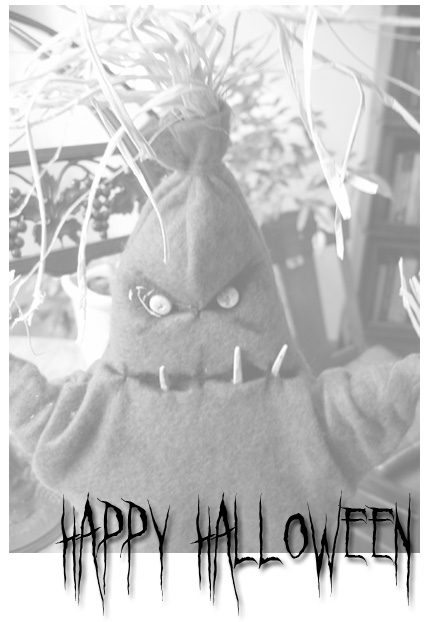
|
Return to our September 2019 issue for Annemann's Enigma from Todd Carr, a Ricky Jay tribute issue of Gibeciere, Nick Trost's Subtle Card Creations Volume 7, and Max Major, Simon Coronel, Robert Ramirez, and Nick Paul at the BPP. |
October 2019 Happy Halloween. It has been a month rich with magic. Richard Kaufman overwhelmed us with talent and bonus opportunities at the fourth Genii convention, David Regal shipped his first mega-book in ten years, and Steve Spill released still more of his secrets and oh-so-commercial routines. Christmas in October! In honor of both Halloween and of a new David Regal book, I am including an item from 2008's The Little Egypt Book of Ghosts. It's called David Regal Goes Psycho, and you will understand that when you read it. The book itself has long been unavailable, though I did see a copy advertised for $869! If anyone wants to pay that much, my kids Vixen and Urchin would likely part with their copies. And despite room temperature reviews, my grandkid and I adored The Addams Family movie. Lots of classic Addams gags and adult-only references. Tis the season. Trick and/or Treat yourself. |
|
|
GENII HOLDS ITS FOURTH -- If you wanted a great convention, all you had to do was rub the lamp, and the head Genii, aka Richard Kaufman, would grant that wish. Thus we have just enjoyed Genii Convention Four with an array of talent both eclectic and widespread (USA, UK, Canada, France, Spain, Australia, South Korea, China, and Honahlee).  The Genii is back in the house.. MOMENTS TO REMEMBER -- Of course, what you take away from any convention depends on what you attend, what you stay awake through, and what tickles your fancy or tugs at your heart. What follows is not a review per se, but a few of the moments from Genii Convention Four that congealed for me into favorite memories, those "I was there when ..." moments. No disrespect is intended toward anyone not mentioned. We knew you were going to be great. Substitutions. I arrived in Orlando seriously disappointed to learn that past Genii favorite Rob Zabrecky was a late-minute no-show. It is almost Halloween, and I was looking forward to his lecture on spirit magic. Nevertheless, Richard filled his spot with Raymond Crowe, who was sensational as will be mentioned below. The other dropout was Akira Fujii, who couldn't obtain a visa. Richard filled that spot with Orlando home boy Terry Ward, who crushed his time slot. With thousands of Disney World performances to his credit, Terry was arguably the most accomplished entertainer on the bill. Class notes. The many well-attended lectures proved that old dogs still enjoy new tricks. Too early for me, but not for those who filled the room to literally overflowing, was Ian Kendall's Basic Training Breakfast. I did arise early enough for David Kaye's kid show lecture and loved his videos of kids screaming insanely during his show. David's analysis of what works for kids is spot on. Jim Steinmeyer's history lesson will have us all looking up Charles Morritt. Eric Jones impressed me teaching the exact fingering for his Three-Fly routine. Michael Chatelain teaches sensational card magic for those who like crafts. Incorrigible pickpocket Hector Mancha had a cool rubber band through neck, how to find a card with his nipple, and how to do Card in Mouth while playing the harmonica. Gaetan Bloom's Standing Card (I did this over 30 years ago at Illusions!) thrilled those who hadn't seen it before, and his Quarte (predicted four-digit number) couldn't have been more out of the box. I need to spend more time with his Miracle Factory books. Showtime. Genii Four provided plenty of magic spread over one-man shows, two Max Maven hosted close-up shows, and three galas. Favorite magic moments ... If you attended it, the one event you won't forget is the late-night Piff the Magic Dragon show. I became a huge fan of Piff when I first saw him eat a banana on AGT, and it was great to finally see him live. But it all went crazy when he introduced (his dad?) Pop the Magic Dragon (aka Penn Jillette) and they challenged themselves to perform Spectator's Urine to Impossible Location. The male magician who had promised to help had gone to bed, and a young lady magician saved the night by offering her own specimen, live on stage behind a sheet. Dragon magic!  Richard forbade celebrity photos, but who could resist Mr. Piffles? I first saw Seinfeld writer Pat Hazell's family slide show at MAGIC Live, and it was hilarious to see it again. His childhood sooo paralleled mine. Steve Martin says you have to be so good they can't ignore you. I had been trying to ignore Mac King stand-in Nick Diffatte all year (I'm getting too old to admire every kid who comes along), but he is so good I can no longer fail to acknowledge how funny, skilled, and young he is. Go back and read his Genii cover story, as I did upon returning home. Another young magi, already on my radar, is Ben Seidman, who is also fall off the chair funny, but fools me badly. How could random numbers shouted from the audience match the serial number on a bill? My favorite performer of this convention was the lovely Lucy Darling, first noticed in these pages in September 2018. Lucy is Mae West funny, Mae West sexy, and has an absolute mastery of her audience. Nice to see her live! On the opening gala Lucy rotated with Hector Mancha and Raymond Crowe. Lucy did such numbers as her "Fool Us" book production and cocktail shaker Chop Cup and Multiplying Bottles, Hector hurled cards and hit me on the arm, and Raymond killed with his animated jacket, Salt Pour, Baby in a Box, silhouette cutting, and Hand Shadows. What a wonderful world! Lucy returned to the gala on Saturday night to share emcee duties with Nick Diffatte. "Just do some skits," Richard had advised them. Right. Some of us noticed Carisa Hendrix (Ms. Darling's alter ego) sitting with Nick on the second floor that afternoon, writing new material. Their eventual "skits" were first rate, with sharp call backs to the magic dragon urine routine of the night before. The emcees set a high bar for that gala's cast of Romany (who had the good grace of not performing Gypsy Thread for the audience's fifth time of the weekend), David Kovac, Jay Johnson, and Jon Archer. The close-up was no doubt wonderful, given the lineup, but harking back to college Astronomy I have difficulty staying awake in a theater seat just after lunch. Nevertheless I enjoyed John Lovick's Little House on the Scary, Hector Mancha's perverse Every Trick Becomes Triumph, and Terry Ward's Three Shell Game. Alexandra Duvivier is gorgeous and charming, or perhaps I was just dreaming. Chats. Genii conventions traditionally feature a major celebrity interview, and this year it was Penn and Teller being interviewed by Randy Pitchford. Penn opened with a most commendable card trick, then settled in for the questions. Teller had some medical appointments, so was available only by video. The memorable facet was that the guys refused to attend unless Richard Kaufman agreed to read in full his scathing review of P&T that he wrote back when they were "the Bad Boys of Magic." He humbly complied, to great laughs. Extras. I did not attend the Escape Rooms or the 49 Boxes, but heard good reports from those who did. On the other hand, I greatly enjoyed, as always, the Genii swag, including a couple of Deland decks, a Penn and Teller deck (amusingly gaffed), a box of snacks, various booklets, tricks, and DVDs, and my favorite: five nicely machined and heavy coins, Genii on the tail side, a famous magician on the head side. Lovely! 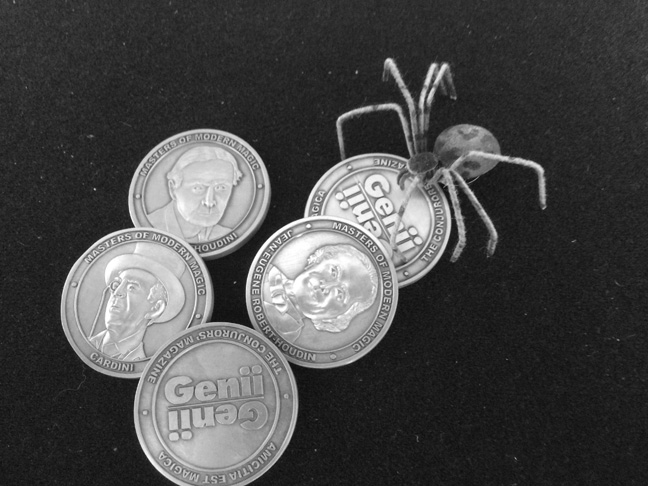 Great swag! Sessions. The best magic of any convention is usually the trick done just for you or a small group. Thanks to Kent Gunn for showing me his Wild Card. Kent loved the story, I loved the numerous gaffs, and everyone loved how magical it looked. Later I caught Gene Anderson and Michael Vincent wowing each other from different approaches. Gene performed with a really crappy old plastic deck and achieved instant revelations and a nice Lie Spell sequence (no skill required; in his book, page 217). Michael achieved beautiful results with beautiful sleight of hand, methods going back to Lepaul. As Eugene used to say, there are many rooms in the house of magic. And finally, Richard Hatch showed me a most deceptive bar bet with a pocket full of change. It became the hit of my granddaughter's birthday party. 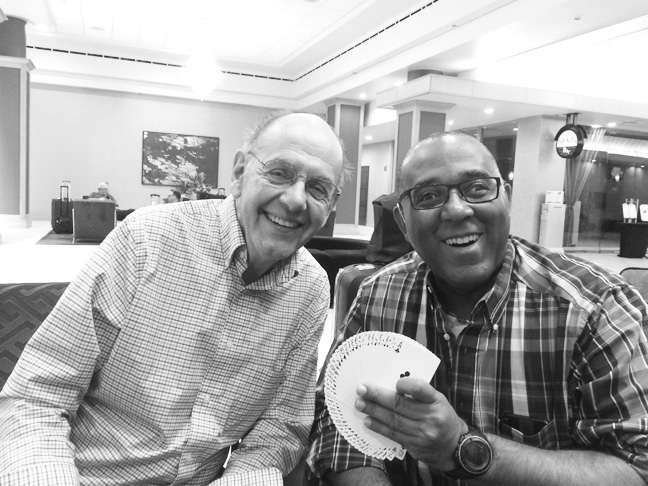 Gene Anderson and Michael Vincent session. Name dropping. -- All the above notwithstanding, the best part of any convention is sharing a few words (and, if lucky, many) with friends and heroes. I was lucky to pass at least a little time with Paul Harris, Noel Britten, Jon Archer, Lucy Darling, John Lovick, Mark Horowitz, Gene Matsuura, Julie Eng, Max Maven, Brad Aldridge, Brad Henderson, Scott Wells, Matthew Holtzman, Kent Gunn, Rosie Rings, Tony Miller, Andy Greget, Jim Steinmeyer, Gene Anderson, Michael Vincent, Charlie Randall, Richard Hatch, Peter Samelson, Jack Shalom, Bill and Becki Wells, Tom Gagnon, John Signa, Harry Monti, Curtis Kam, Alan Howard, Dustin Stinett, and of course Richard and Liz and Emma Kaufman. Lest I be accused of gratuitous name dropping, note that some exchanges were of no greater extent than "Get out of that seat. It's saved!" Also great to chat with Indiana friends, Little Egypt Magic readers, and various dealers, plus saw other friends and heroes but never got close enough to say hi. Thanks and love to all. |
|
|
DAVID REGAL SHIPS -- Immersing yourself in David Regal's massive new book, Interpreting Magic, is akin to attending the best magic convention ever. Not only are there over 60 new Regal-level magic tricks plus 18 new essays, but David conducts in-depth conversations with over 30 of your favorite magicians. It's hard to imagine a convention that has ever amassed more A-list performance pieces, advice, or talent. Magic. David's magic tricks are characterized two ways, first by Caveney-level scripts (I could equally reverse the compliment and say that Caveney's scripts are Regal-level; these are two of the best writers in magic) and second by Gaetan Bloom-ish methods and premises. Who else thinks of such oddball approaches as using a Chinese Egg Bag to vanish and produce a glass of beer?  Now shipping! The tricks are subdivided into Cards, Card Moves, Close Up Magic (non-card), Card &, Monte, The Rainbow Set, and Stand-Up & Stage. To mention a few of the items I'd like to try (note: I tend to favor the more conservative methods) ... The Tri-Swindle Control is a bluff replacement, and I love bluffs. Tossed Across combines Cards Across with the Tossed Out Deck. The method fascinates me. Marlo's Favorite Aces is a great Spectator Cuts to the Aces, a Marlo favorite tipped to David by Johnny Thompson. This is the trick in the book I am most likely to perform. Ladies & Gentlemen. One more version, and a nice one, of the Hotel Mystery. Not Hattie. My all time favorite David Regal bit is The Opener aka Dear John. It's a gag, not an actual trick, and that is the case for Not Hattie. But very funny. Illegal Turn Control is another bluff. This reminds me of Lee Asher's Losing Control. Office Epic is Mental Epic with three white cards. The Secret is a fast change routine using "New York" and "New Jersey" money. Glass & Gold is a vanish and reproduction of a borrowed ring from a shot glass. You & Me is a drawing duplication effect using business cards. Very clean. I could see using this in a seance. NO is a fun trick if you can find the required NO button. I don't like the surprise ending (TFP), but that is easily replaced. The build up and the basic method are great. Our Daily Bread is the strangest trick in the book. You cook a grilled cheese sandwich by magic. Essays. The essays range from performance advice to memories. My favorites were David's one-time meeting with Marlo and a gag involving Max Maven's heart surgery. Conversations. But it is the conversations that thrilled me and make this book a must purchase. Here are the 31 reasons to buy it: Simon Aronson, Barry & Stuart, John Bannon, Gaetan Bloom, Eugene Burger, Derren Brown, Lance Burton, Angelo Carbone, John Carney, Mike Caveney, Raymond Crowe, Charlie Frye, Helder, Guimaraes, Neil Patrick Harris, Guy Hollingworth, Kevin James, Mac King, Martin Lewis, John Lovick, Max Maven, Eric Mead, Jeff McBride, Andy Nyman, David Roth, Jim Steinmeyer, Suzanne, Juan Tamariz, Teller, Johnny Thompson, Paul Vigil, Michael Weber, David Williamson, R. Paul Wilson, and Rob Zabrecky. Getting back to the convention metaphor, what a gathering it would be to encounter all these guys under one roof. I have known all these by reputation and many personally, yet David was able to elicit core info from virtually all of them that surprised me. Such as ... The interplay among various names. Tom Mullica once heavily influenced a serious David Williamson. But it was David Williamson who influenced John Lovick and Guy Hollingworth. Guy even performed a la David Williamson, complete with American accent. Oh to have a video of that! Jeff McBride's aunt was the daughter of Clayton Rawson! Simon Aronson lays out the history of his card code in great detail. Jim Steinmeyer discusses his first contacts with Doug Henning, back when Jim had little reputation, just great ideas. Michael Weber discusses the impossible trick of putting the toothpaste back into a signed tube. Johnny Thompson's first harmonica cost 75 dollars. (Mine was $3.50.) Charlie Frye had really big (clown) shoes to fill. Rob Zabrecky's autobiography Strange Cures omitted his achievement that impresses me most: he was a surfer at a very young age, when rival gangs roamed the surfing spots. Both physically and socially, he contended with danger early on. I am in awe. Most magicians complain that they have nowhere to be bad. Although I can't imagine David Regal having ever been bad, he certainly has a great place to be original: the Magic Castle. What a delightful laboratory in which to perfect his screwball masterpieces. Because most of us are familiar with David Regal either live or via YouTube or on Kozmo's reel magic magazine, we can "hear" all the tricks in this book being performed, thanks to the full scripts. Again, back to the convention metaphor, hours of "performances" by David Regal are part of the package. Quite the deal. Interpreting Magic is a swell whopper of a book at 554 oversized glossy pages, with over 1000 photos in full color, foreword by Michael Carbonaro, $75 plus $6.50 postage from davidregal.com. It's a "convention in a book" at a fraction of the price of a real convention.
Chapter 7 of The Little Egypt Book of Ghosts was titled "The Others," and it contained spooky takes on 15 routines elsewhere available in the literature. The chapter leads off with this take on a fine David Regal routine: In his book Constant Fooling (Volume 2), David Regal includes a terrific audience participation trick called “Journey to Love.” The routine is a sort of “Dating Game” dramatization that plays huge, involving three male spectators, a lucky female contestant, and a clever number force. It’s a comedic routine, and the basic gag is that the female wins a “journey to love” with the magician to what should be one of the world’s stellar hotels, but which turns out instead to be the Econo-Lodge. As most of you know, David is a professional comedy writer, so the lines in this routine are very funny, as expected, and the routine is a lot of fun to perform. All we had to do to transform this light comedy routine into a dark comedy routine was to change the hotel force from the Econo-Lodge to the Bates Motel, as my engraved room key tag with the predicted room number shows. When the young lady gets the bad news, the line is “Don’t worry about it. Everything will be fine. We just won’t take a shower.” 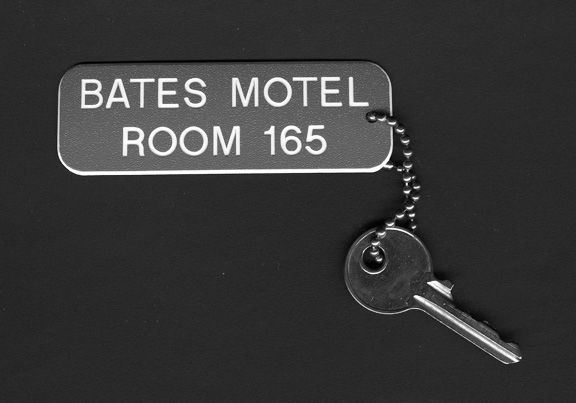 Leave Norman a big tip. Tomorrow is Mother's Day. David recommends playing a song with a sappy, romantic theme during the routine. For my generation, that song is Percy Faith’s “Theme from A Summer Place,” though none of us considers it sappy. Ah, that summer, that Sandra Dee. |
|
|
STEVE SPILL TELLS ALL -- Steve Spill makes me laugh. I became a huge fan in the early eighties, visiting his and Bob Sheets' Brook Farm Inn of Magic a half dozen times, the most perfect full evenings of dining and magic I can imagine. If you have never encountered Steve's twisted sense of humor, you can via YouTube (see my notes in July 2019) or through his more formally compiled DVD, 10 Years of Steve Spill 1980-1990. Alas, you can no longer encounter him at Magicopolis, at least not on a regular basis, as he has sold the establishment to the Magic Castle's Randy Sinnott. More recently, you can encounter Steve in his new book, Magic Is My Weed. Said book mimics the previously praised How to Make Love the Steve Spill Way, with about half devoted to essays (theory and history) and half to a dozen fully polished professional stage routines.  Now shipping! Theory. The opening chapter "Let's Party" makes the case that performing magic generates extreme bliss (the drug metaphor), a true high for a boy who grew up loving (as I did) magic, old rock and roll, and various magazines (Mad, Famous Monsters of Filmland, and Genii). Ah, but unlike me, Steve's dad was a Magic Castle medium and his "uncles" were Dai Vernon and Charlie Miller. Not fair. He sold Magicopolis not so much for getting bored of performing (although he did over 200 shows a year for 21 years) as for "work" (paying employees, making the monthly nut, etc.). He has dropped back to a few shows a month. The rest of the chapter focuses on agents and managers, show producers, being a wisecracking hippie, being yourself on stage (huge part of the Love book), the notion that humor enhances mystery, being more analog than digital, and what the rest of the book promises, especially if magic is your weed. That promise includes theory chapters on exactly how to address various aspects of stage performance, analysis I've seen rivaled only in David Kaye's work on kid shows. "Spur of the Moment" addresses improv: why you should do it and how you can do it. Why increases being now with your audience. As to how, Steve advises no fourth wall, thinking while they are laughing, saying the second or third thing rather than the first, interviewing spectators and reacting to their answers, living a full life, reading humor, being informed, applying the acronym PESK to your routines to make them funnier, and limiting profanity. (That last suggestion does not apply to magic books.) Regarding humor, I regularly read Steve's suggestions of James Thurber and S.J. Perelman and would add to his list P.G. Wodehouse, Jean Shepherd, and Peter De Vries. "OA" is Steve's technique for controlling a general audience via callbacks and tags. It is guaranteed to generate plenty of oohs and ahs. "The Dope on young Humans" is Steve's strategy for controlling a theater full of young kids -- school field trips were popular at Magicopolis. Let's just say the method would be explosive. I have often wondered: the rumor at Brook Farm was that Steve and Bob Sheets used to host pizza matinees for kids only. Could these kid control techniques have been developed there? "Paparazzi!" contains general thoughts on entertaining teenagers -- graduation parties were popular at Magicopolis -- along with a specific strategy involving a pop-up necktie. I must admit the latter made me a bit squirmy, and I am someone who performed and published Love Potion Number 9 (a unique Card from Fly routine) and The World's Most Obscene 21 Card Trick (The Little Egypt Book of Numbers). Steve's teen chapter concludes with some ideas on performing for seniors. "Tough Skin" takes me back to the MAGIC Live session called Ghost Stories, hosted by Mac King and Max Maven in scout uniforms by a campfire. Various pro magicians told horror stories of their worst performances. This chapter contains Steve's worst, and they are really bad. The chapter concludes with Mark Wilson's advice on what to do when things go that wrong. Magic. And then we have a dozen complete routines with all the little touches that have made them so great over thousands of performances. Among them ... Mind Reading Goose is Steve's most iconic trick. I doubt that you are reading this review if you are not deeply familiar with it. "Not bad for a goose!" There is a great story about how the routine evolved from a car ride with John Kennedy (the magician, not the President), Tim Conover, and a bumper sticker that read SAVE A TREE, EAT A BEAVER. All the performing details are here, including permission to perform it, but you will be money and time ahead if you purchase the whole darn thing from Bob Kohler. 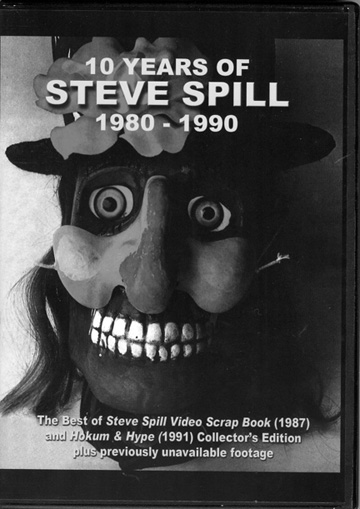 See the material performed here. Grab N Stab is Steve's Russian Roulette routine with five knives. Don't worry about it failing: it fails every time, with a great comic ending. Broken Mirror is a bizarre effect, with a Satanic message in blood on a piece of broken mirror. Perfect for Halloween. Rice Paper is Steve's Paper Balls Over the Head routine with toilet paper that he and Bob Sheets turned into a hilarious two-person routine, at least twice as funny as any prior version. Wife Bozena later handled the honors at Magicopolis. History note: Steve first encountered this routine as a volunteer for Slydini himself. And eight more: a terrific mind reading routine re menu selections, a Miser's Dream that uses a pot, a spoon, and six dollar coins, a business card force, a mental effect for Multiplying Bottles, a manipulation trick with a Cub Scout neckerchief slide, a new use for a Grant Temple Screen, a haunted record album collection, and a Mother's Day wrapping paper restoration. As I opened, Steve Spill makes me laugh. Not just on stage, but in his writing. He has a humor-centric approach to life and the written word. But funny as he is (his writing is up there with Regal and Caveney), the best laugh in the book goes to Bozena, for her comment at the bottom of page 210. I am still laughing. Like the previous book: Hard cover, 238 pages, highly entertaining writing, with funky illustrations by the author, from Magicopolis.com. $125. Are there more of these books in the pipeline? I am thinking illusions. The Spill-Sheets Substitution Trunk and the Levitation of a Lady from the Audience play large in my memory. |
|
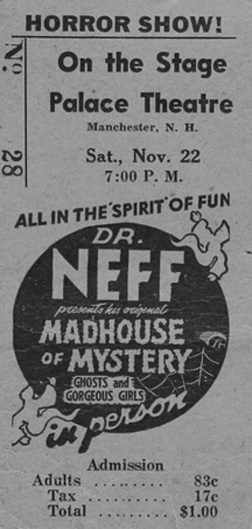 Only one dollar to see Neff.
Put on a mask and knock on someone's door.
Follow us on Twitter. Title photos are from The Little Egypt Book of Ghosts. Neff ticket courtesy of Joe Hanosek. Little Egypt Magic is the erratically updated web site of Steve Bryant, spawned (the site, not Steve) by a former internet magazine known as The Little Egypt Gazette/for magicians only. Steve Bryant is an obscure magician and writer who generates this site from an iMac in Bloomington, Indiana. He used to frequently journey to and perform magic in Little Egypt, the local name for extreme southern Illinois, where the towns bear such names as Cairo, Thebes, and Karnak. Past issues of this web site: Index to Past Issues Closing photos since 2007: Rotogravure Notice: Any limited use of copyrighted images or quoted text is considered fair use, usually to review whatever product or event that is under discussion. If you object to use of any material, please get in touch and it will be cheerfully removed. |
A JSB Creations product
Copyright© 2019 by Steve Bryant